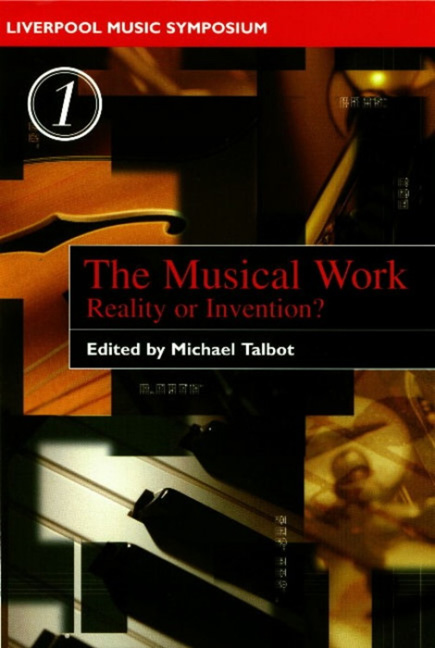Book contents
- Frontmatter
- Contents
- Notes on Contributors
- Introduction
- 1 Some Thoughts on the Work in Popular Music
- 2 Intertextuality and Hypertextuality in Recorded Popular Music
- 3 Work-in(g)-Practice: Configurations of the Popular Music Intertext
- 4 Work and Recordings: The Impact of Commercialisation and Digitalisation
- 5 The Practice of Early-Nineteenth-Century Pianism
- 6 Looking Back at Ourselves: The Problem with the Musical Work-Concept
- 7 ‘The Work’: An Evaluative Charge
- 8 The Work-Concept and Composer-Centredness
- 9 The Musical Artwork and its Materials in the Music and Aesthetics of Busoni
- 10 Re-composing Schubert
- 11 ‘On the Problems of Dating’ or ‘Looking Backward and Forward with Strohm’
- Index of Musical Compositions and Collections
- Index of Personal Names
1 - Some Thoughts on the Work in Popular Music
- Frontmatter
- Contents
- Notes on Contributors
- Introduction
- 1 Some Thoughts on the Work in Popular Music
- 2 Intertextuality and Hypertextuality in Recorded Popular Music
- 3 Work-in(g)-Practice: Configurations of the Popular Music Intertext
- 4 Work and Recordings: The Impact of Commercialisation and Digitalisation
- 5 The Practice of Early-Nineteenth-Century Pianism
- 6 Looking Back at Ourselves: The Problem with the Musical Work-Concept
- 7 ‘The Work’: An Evaluative Charge
- 8 The Work-Concept and Composer-Centredness
- 9 The Musical Artwork and its Materials in the Music and Aesthetics of Busoni
- 10 Re-composing Schubert
- 11 ‘On the Problems of Dating’ or ‘Looking Backward and Forward with Strohm’
- Index of Musical Compositions and Collections
- Index of Personal Names
Summary
If, as a starting point, we may take a musical work to be a discrete musical object, it is almost a cliché to say that the academic study of popular music is very much in two minds about it. Academic theoretical writing on popular music has frequently borrowed the term ‘text’ to denote this object: a usage not without its problems, as you will be told by anyone with the experience of teaching ‘textual analysis’ to students who assume, until instructed to the contrary, that it means the study of lyrics. The tradition of ‘textual analysis’ is a persistent one, but sociological, ethnographic and economic research has pointed to the need (sometimes seen as overriding) to concentrate attention on the productive and receptive processes and to question the idea that it is possible or desirable to separate a musical object from these processes. At the same time, within text-based approaches themselves, the impact of critical theory has contributed to the challenge posed to the ongoing existence of paradigms based on the idea of a ‘work’.
But I would really rather begin elsewhere, in a wider, less rarefied context, where an academic approach is only one among many, and point to the obvious fact that in the everyday language of popular music practice in anglophone countries the term ‘work’ is rarely, if ever, found. I strongly suspect that its equivalents in other languages – oeuvre, Werk etc. – make equally rare appearances. This may sound an unpromising opening, but I should add straight away that describing this as an ‘obvious fact’ is somewhat disingenuous on my part, because I confess that I cannot remember ever consciously considering the matter before. So if it is obvious, I also – naïvely, perhaps – find it surprising, and therefore worth exploring a little further.
By ‘popular music practice’ I mean the several interconnecting spheres that make up this environment: not only the sphere of music-making but also those of the music industry, of commentators on the phenomenon in their various guises (including academic) and of the audience. In the discourse of this practice a popular musician may speak of ‘my music’ or ‘my songs’; in certain genres, he or she may say, ‘Here's a new number’.
- Type
- Chapter
- Information
- The Musical WorkReality or Invention?, pp. 14 - 34Publisher: Liverpool University PressPrint publication year: 2000

